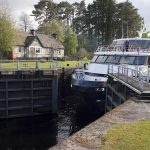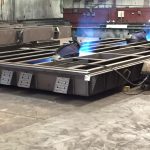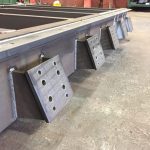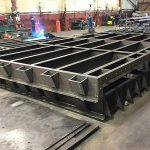News update for Kytra Lock gate replacement for Scottish Canals
ECS Engineering Services announced in March 2017 it has been awarded a contract by Scottish Canals, to design and install four lock gates at Kytra Lock on the Caledonian Canal. Now at the mid-point of this large undertaking, ECS discusses the progress and how it has overcome the challenges so far.
As a popular tourist spot steeped in heritage, preserving the environment and minimising disruption around Kytra was a major concern for Scottish Canals. One of the most naturally appealing stops along this stretch of water, the work at Kytra constitutes part of a systematic replacement of infrastructure along waterways in Scotland.

ECS initially undertook a detailed survey of the existing lock, including the use of divers. Offering two lock gate designs, one based on traditional style steel lock gates and an alternative using gates made from fibre reinforced polymer (FRP), Scottish Canals wished to retain a traditional construction for the infrastructure of the canal and opted for the steel solution. ECS’ design is in accordance with the Historic Environmental Scotland Ancient Monument consent, requiring the new installation to seamlessly integrate with its surroundings and closely match the original lock gate design.
Two pairs of lock gates are currently being manufactured at ECS’ Sutton-In-Ashfield factory in Nottinghamshire. Each of the two downstream lock gates are 6.5 metres wide with a height of 8.27 metres and weigh 18.65 tonnes. The two upstream lock gates are 6.5 metres wide with a height of 5.89 metres and weigh 13.3 tonnes. The manufacture of the lock gates poses a particular challenge due to the size of each structure, however ECS is very experienced in this type of work and has the facility to manage projects of this scale.
During the design and procurement stages of this project, ECS was faced with the fragmented location of the personnel involved in the project, including several key contractors and suppliers. This required a new way of thinking to reduce the carbon footprint created by a lot of travelling and to prevent project delays often encountered when exchanging details between various parties, particularly when decisions need be made on such matters as project layout, design drawings and material specifications.
ECS overcame this by the introduction of a weekly video conferencing meeting. Using a working 3D computer aided design (CAD) model as the basis for discussion and agreement, the model increases in detail throughout the project and challenges are discussed and overcome in real-time with the consent of all involved parties. An example of this working is when, at a point during the design process, the client requested traditional wooden lock spears to be incorporated in the lock gate. ECS sourced a specific wood and finish made from Douglas Fir to remain in keeping with the heritage while not affecting project delivery.
Lee Pearson, Contracts Manager at ECS comments: “The timescale for this project is tight. However, by incorporating real-time, weekly video conference progress meetings with the client and including other ECS contractors and suppliers in the meeting, we agree each project stage as we go, thus providing the client with effective project management.”
When the design was nearing completion, a face to face meeting was held at the client’s offices. As everyone was already familiar with each other due to the weekly meetings, the final design sign-off was swift, involving very few changes. Now work can continue, with the defined end goal in sight.
- Kytra Lock, Caledonian Canal, Scotland
- Two pairs of lock gates are currently being manufactured at ECS Engineering Services to be installed at Kytra Lock on the Caledonian Canal.
- Scottish Canals wished to retain a traditional construction for the infrastructure of the canal and opted for the steel lock gates.
- ECS Engineering Services design is in accordance with the Historic Environmental Scotland Ancient Monument consent, requiring the new installation to seamlessly integrate with its surroundings and closely match the original lock gate design.









